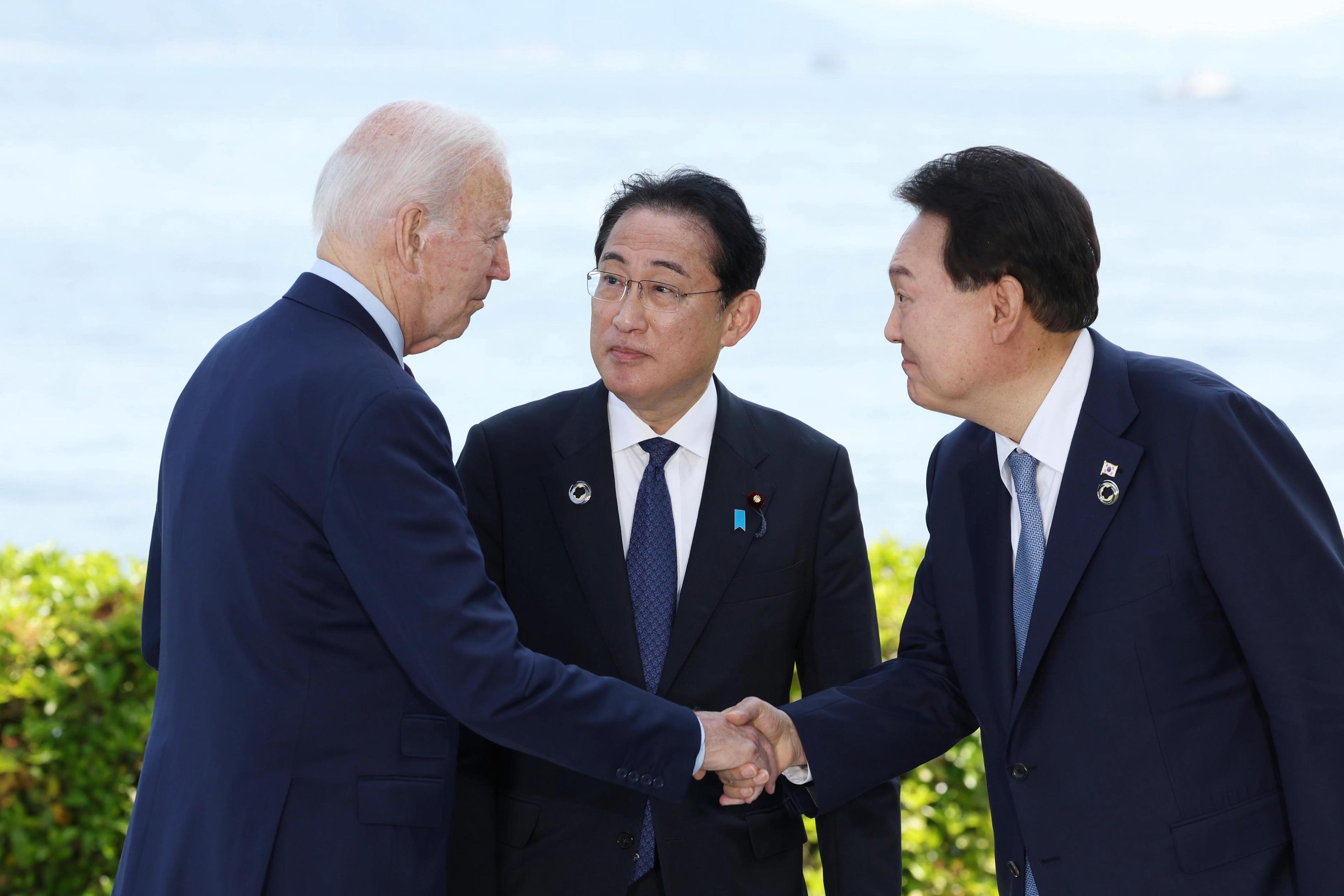 US President Joe Biden (left) shakes hands with Republic of Korea's President Yoon Suk Yeol (right) as Japan's Prime Minister Fumio Kishida looks on ahead of a trilateral meeting on the sidelines of the G7 Summit Leaders' Meeting in Hiroshima on May 21, 2023. (PHOTO / AFP)
US President Joe Biden (left) shakes hands with Republic of Korea's President Yoon Suk Yeol (right) as Japan's Prime Minister Fumio Kishida looks on ahead of a trilateral meeting on the sidelines of the G7 Summit Leaders' Meeting in Hiroshima on May 21, 2023. (PHOTO / AFP)
East Asia may experience more instability, experts warned, as the United States, Japan, and the Republic of Korea aim to strengthen their security cooperation at a landmark trilateral meeting at Camp David, the US presidential retreat.
“The strengthening of military alliances among Japan, the United States, and South Korea will undoubtedly bring about destabilization in the region,” said Satoshi Tomisaka, a professor at the Institute of World Studies at Takushoku University in Tokyo, noting that this is most likely to be the case when the US attempts to utilize Japan and the ROK to isolate China.
“This is likely to lead to an escalation of provocations against China,” said Tomisaka. The ROK is also referred to as South Korea.
The moves by the US also reflect the current anxiety stemming from the ineffectiveness of Washington’s strategy in the Asia-Pacific
US President Joe Biden is hosting his Japanese and ROK counterparts for a trilateral meeting at Camp David in Maryland on Aug 18.
It will be the first stand-alone meeting among the leaders of the three nations. Japanese Prime Minister Fumio Kishida and ROK President Yoon Suk-yeol will be the first foreign leaders to visit Camp David under the Biden administration, as well as the first to visit since 2015.
ALSO READ: US-Japan-ROK summit sparks security concerns
John Kirby, US National Security Council coordinator for strategic communications, said in a media briefing on Aug 16, “It’s really about moving our relationship with each other and amongst each other to a whole new level.”
Security issues will be among the key focuses of the meeting, analysts said.
The goal of the trilateral meeting can be seen as an intensified alliance to counterbalance China and Russia, said Lee Chang-ho, chairman of the Korea-China Exchange Promotion Committee, a civil group in the ROK.
“In other words, it is about the establishment of a trilateral alliance between the US, ROK, and Japan, like a ‘mini-NATO’, that can promote strategic economic relationship based on security cooperation in response to China’s rise as a major power,” said Lee.
Strengthening cooperation with the ROK and Japan will also be conducive to the US’ long-term international influence, said Lee.
ALSO READ: Camp David meeting attempt to weave Seoul closely into Washington's designs
The trilateral meeting can be seen as a US-centered one to realize new values, said Kim Moon-jun, a professor of the KNU Corporate Management Institute at the Kongju National University in the ROK.
The main agenda of the meeting will include the advancement of economic cooperation in key technologies, the re-establishment of a strategy to upgrade security and economic cooperation to counter China, and enhancing joint response capabilities against the Democratic People's Republic of Korea, said Kim.
According to media reports, it is also expected that Japan will seek support from the US and the ROK to its plan to discharge the nuclear wastewater from the crippled Fukushima Daiichi plant.
Noting the Yoon administration has already hinted its support for the discharge plan, Kim said the main issue within the country will be how much the ROK president can express in terms of how its people are protesting against the discharge.
The moves by the US also reflect the current anxiety stemming from the ineffectiveness of Washington’s strategy in the Asia-Pacific. If China responds patiently and resolutely, the intentions of the US might backfire, said Tomisaka, from Takushoku University.
ALSO READ: ROK should think twice before going all in with US
In a daily news conference on Aug 15, Chinese Foreign Ministry spokesman Wang Wenbin said China opposes relevant countries assembling exclusionary groups to undermine the strategic security of other countries.
“Globally, protectionism is on the rise, leading to economic bloc formation. In this environment, excessive strengthening of military alliances can stimulate hostile relations,” he said.
“However, Japan appears to be facing the current situation not with a broader perspective on stable positioning, but rather with a narrow view of how to respond to US demands.”
Reflecting upon the extensive harm Japan inflicted upon Asia during World War II and considering Japan’s post-war commitment to seeking peace, it is disheartening to see recent developments where Japan is again introducing tensions into the region, Tomisaka added.
READ MORE: US subs in ROK raise concern
In a speech celebrating the ROK’s National Liberation Day on Aug 15, which marks the end of Japan’s imperial rule in 1945, Yoon said Japan is a “partner” that shares universal values and pursues common interests.
His speech was criticized by the opposition as neglecting the country’s painful history with Japan.
Contact the writers at kelly@chinadailyapac.com


